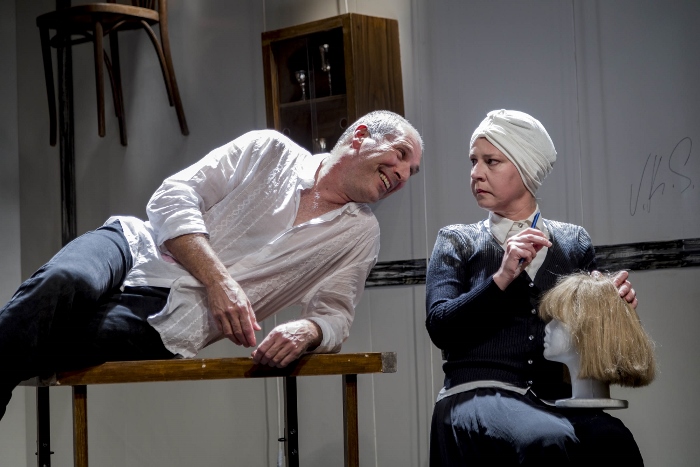
Touching one of the deepest wounds in Israeli society – the deep chasm between religious and non-religious life – with sensitivity, intelligence and artistry, the Khan Theatre production of Yosef Bar Yosef’s Butcheh, directed by Igor Berezin, is a moving and thought-provoking play, illuminated throughout by outstanding performances from the ensemble of actors. Butcheh (David Ben Zeev), suddenly returns to the family home after a 25-year absence; it is, and yet it is not quite the return of the prodigal son. He claims to have received a call from his father Eliyahu (Arie Tcherner), who is ill, asking him to come home. It is a visit that will rattle the foundations of the house, and shake up its inhabitants, raising questions of love, loyalty, desire, freedom, commitment, and identity.
Vadim Keshersky’s design for the play (set and costumes) is a work of art in itself, making a profound impact on all who enter the theatre. Tables, bookshelves, and chairs hang on the walls, all wood, with a time-worn feel to them, the suggestion of a home rather than a home; life in limbo. Objects of use, secular and sacred, are not in use, but rather hanging on the wall, like objects in a museum: the fur hat and ornate Shabbat coat, the long black coat, a woman’s wig. Displacing the objects stresses their symbolic value, raising myriad associations: what represents home to us? What does our family symbolize, and what do we represent in the minds of others?
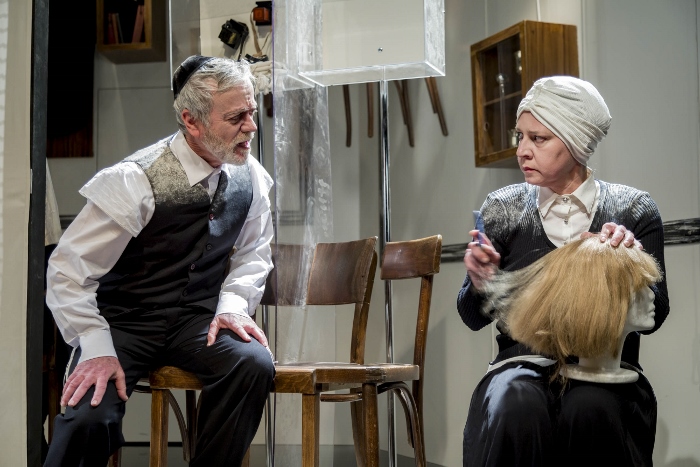
When we leave a place, we expect it to remain unchanged, as it lives in our memories. It lives on in our imagination, hanging, frozen in time. The internal museum of the past in our mind. The set is a visual, physical representation of the play’s underlying themes. Butcheh’s sister Naomi (Irit Pashtan) and her husband Nissan (Yehoyachin Friedlander) sit side by side, yet apart, in two chairs sawed apart and put back together again, separated by a clear plastic wall. Up above, there is another image of separation and discord. What signifies a house torn asunder more than a chair sawed in half, the two halves set on opposite sides of the stage, each resolutely turned away from the other?
Yet at the same time, there is something playful and lively about this displacement. Perhaps the suggestion that everything can be turned around and viewed differently. A distinctive aspect of the play is that almost all the actors are onstage, even when they are not active participants in a scene. This gives them the function of silent witnesses, and establishes a sort of equivalence between the furniture and the people of the house; they are all always present even in their absence, they are part of the home that lives in the mind and imagination. The religious home is represented as a place of rules and restrictions, a place where one perseveres in good deeds and fulfilling one’s duty. From this perspective, the non-religious life is one of sin. The religious community is very tightly knit, to depart from its rules and customs is to part forever from the community. To choose a non-religious life is to choose freedom and the fulfillment of desire. Yet it is also a loss, as one leaves behind not only the black coat, but also the person you were when you wore it.
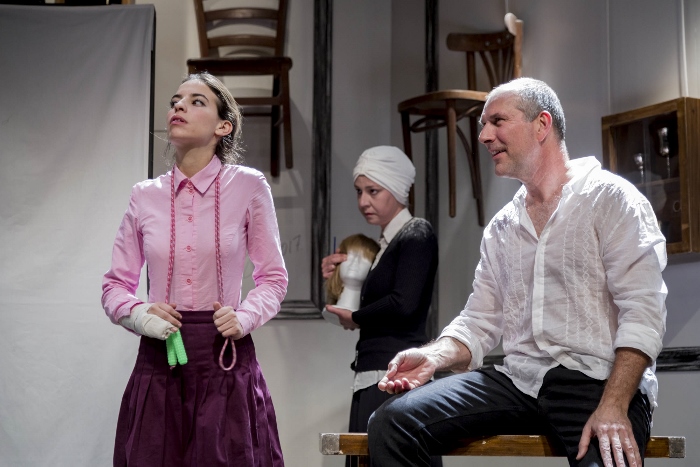
These are just some of the many thoughts and feelings evoked in the play, amidst the dramatic, disruptive return of Butcheh. Why has he come? Did Eliyahu really call him? Or is that just his excuse, a story he invented? And why now, after 25 years? The divide between Butcheh and his family is not easily bridged, their lives are entirely different, a difference which the play explores with wit and humor. When Butcheh sings in the shower, his brother-in-law Nissan comments in a rather annoyed tone: “That is what you do in the big world you sing in the bath. Their bodies make them happy.”
Yet Nissan too yearns for happiness, a happiness that eludes him, as he tells Naomi, “getting a smile out of you is like pulling teeth.” It is a family torn apart by conflicting beliefs, by feelings of jealousy and betrayal, yet at the same time, they are bound together by love, or the desire for love, and their shared memories, memories that bring both pleasure and pain. Butcheh blunders back into family life eagerly, David Ben Zeev exudes a charm and vitality that inexorably draws the reluctant family back to him, despite their reservations. Bewildered, resentful, and with a wistful nostalgia for the past, Yehoyachin Friedlander delivers a touching and humorous performance as Nissan, the friend turned brother-in-law. Irit Pashtan is exquisite as Naomi, the dutiful daughter and wife, paragon of virtue who cares for those in need. Her eyes flash and storm, they seek and question, revealing the turbulent emotions, the anger and passions that lie behind the silent obedience. Arie Tcherner is the unyielding patriarch, pale as a ghost, trembling with rage and frustration at the path chosen by his only son, yet beneath the stern veneer is the tenderness, vulnerability, and eagerness of a father who would like to embrace his son.
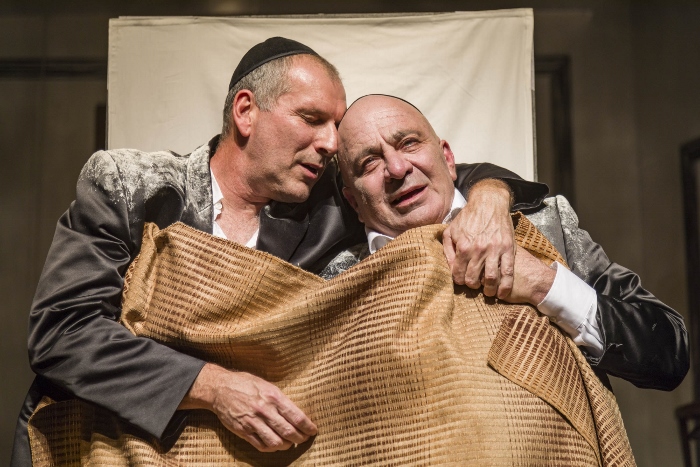
Leah (Noam Shenhav), the neighbor’s daughter, brings a bright spot of color into the dark dilemmas of the family. Skipping in on her jump rope, she is still a child, hopeful, idealistic, believing in the integrity of her dreams because she has yet to act on them. Hirsch (Dima Ross), an employee at the family-owned winery, lightens the mood, rolling in with his mini-distillery and urging Butcheh to offer his expert opinion on the recent vodka experiments. Ross imbues this role with the airy feel of a slightly confused sprite, a gentle clown with soft voice and gestures. Like Shakepeare’s fools, he is the ludicrous character that elicits laughter in his every appearance, ultimately, the unlikely keeper of wisdom.
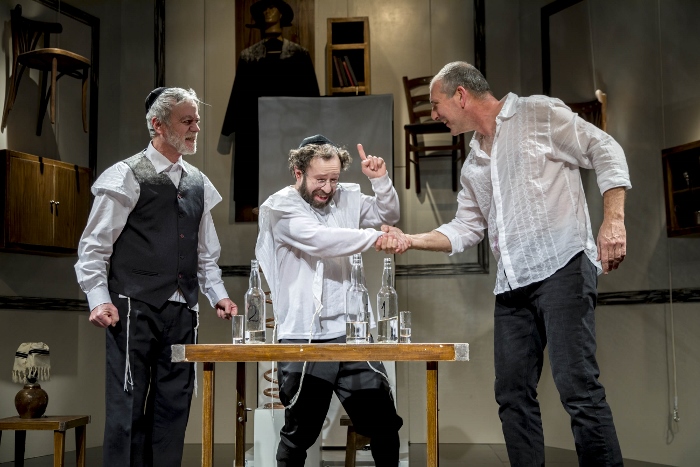
Butcheh
By Yosef Bar-Yosef; Directed by Igor Berezin; Set and Costume Design: Vadim Keshersky; Lighting Design: Roni Cohen; Music: Boris Malkovsky; Choreography: Michael Getman; Actors (in order of appearance): David Ben Zeev – Butcheh, Irit Pashtan – Naomi, Yehoyachin Friedlander – Nissan, Arie Tcherner – Eliyahu, Dima Ross – Hirsch, Noam Shenhav – Leah, Guy Gurevich – Lunatic.





